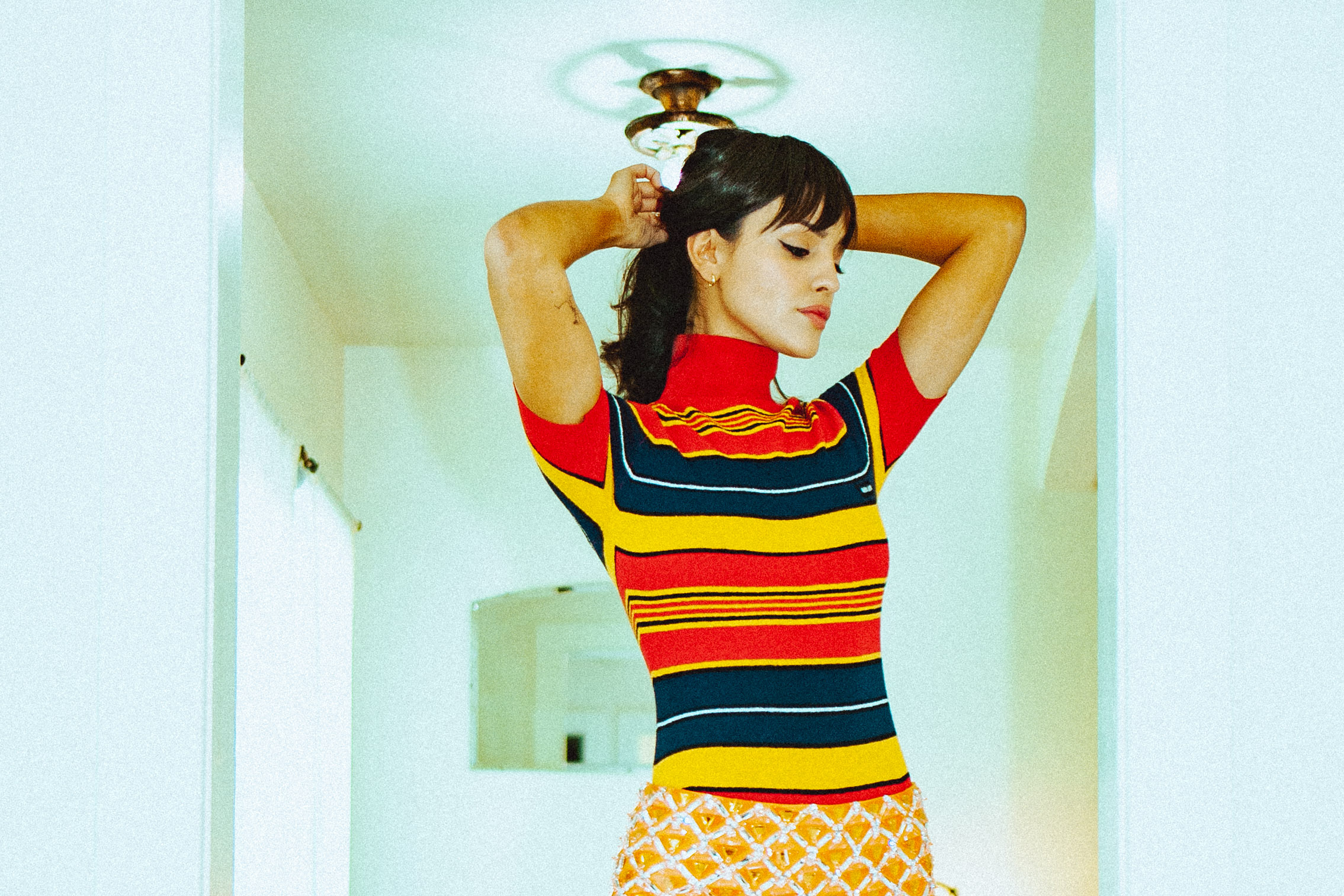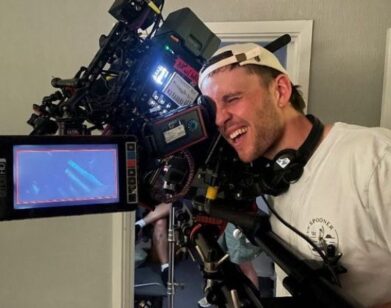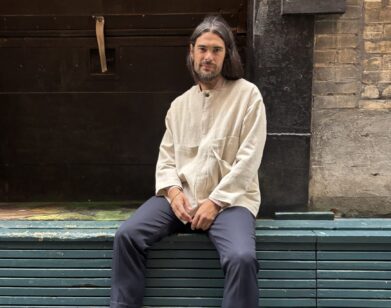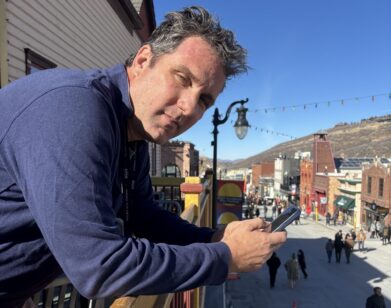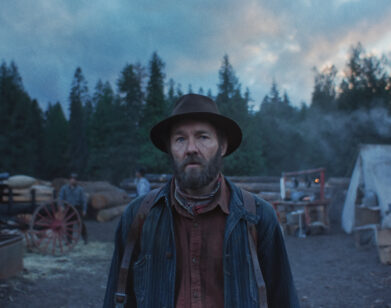in conversation
Eiza González and Taika Waititi on Industry Expectations and How to Beat Them
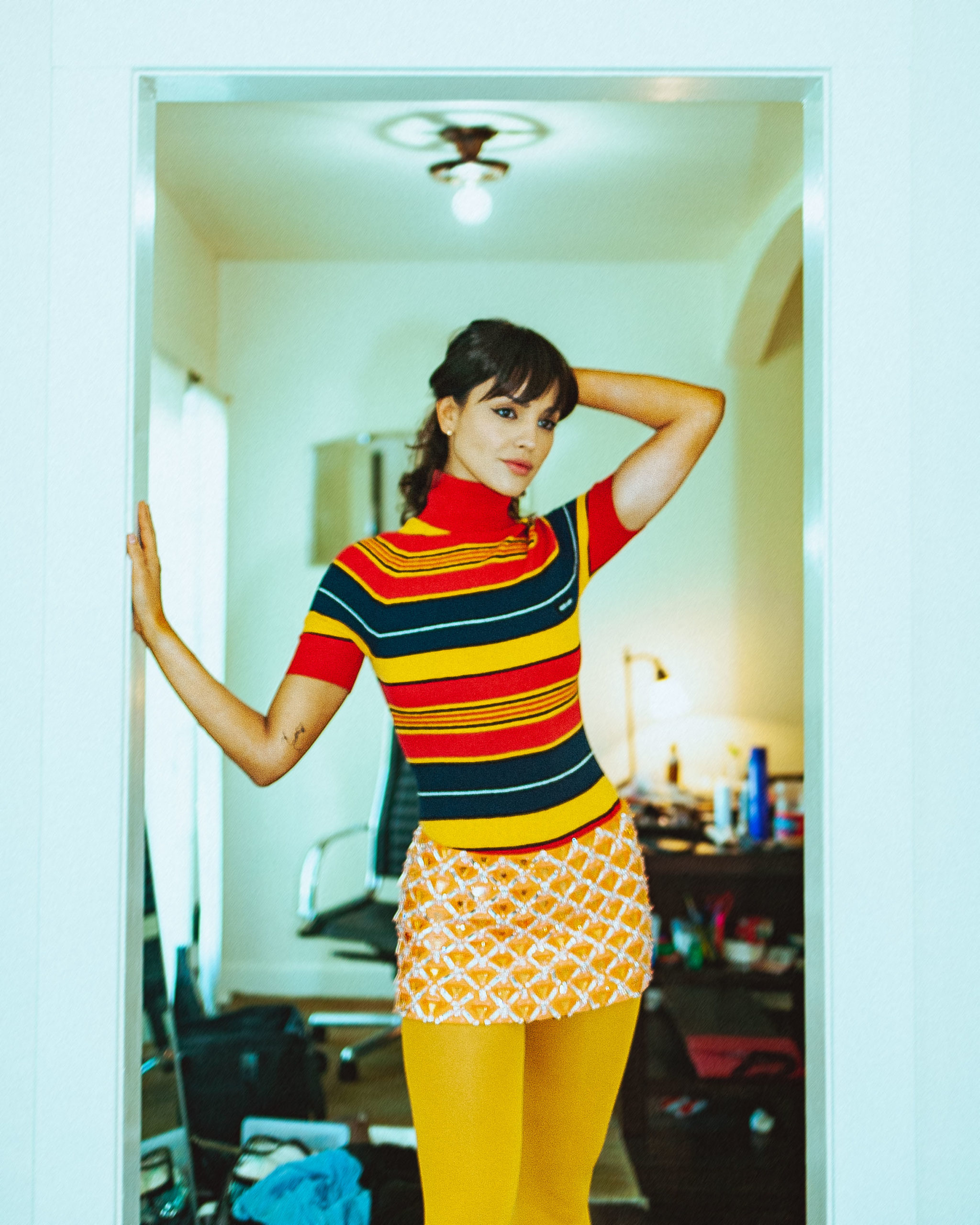
Top and Skirt by Miu Miu. Hat by Lack of Color. Earrings by Mejuri. Tights by Falke. Shoes by Giuseppe Zanotti (worn throughout).
In the new mega-blockbuster Godzilla vs. Kong, a group of humans do their best to get out of the way as those two monster-movie legends throw down. One of them is the shady tech executive Maia Simmons, played by Eiza González. And while the movie itself is an excuse to watch a giant ape and a massive lizard lay waste everything in their path as they try to destroy one another, for the 30-year-old Mexico City native, the role felt significant. Here was a young Latina woman running a giant (if somewhat nefarious) corporation, a departure from the kinds of parts González had been offered since she made the transition to Hollywood in From Dusk Till Dawn: The Series where she played Santanico Pandemonium, the demonic stripper made famous by Salma Hayek in the original film. Since then, González has been busy, playing a bank robber in Edgar Wright’s Baby Driver, and as yet another thief in the Fast & Furious spin-off Hobbs & Shaw. Next up, González will play a paramedic opposite Jake Gyllenhaal and Yahya Abdul-Mateen II in Michael Bay’s action thriller Ambulance, and it was from the set of that movie that she connected with her friend, the filmmaker Taika Waititi, to discuss, among other things, the familiar boxes Hollywood place you in, and how to go about escaping them.
———
TAIKA WAITITI: You and I have already done this interview about 30 times in my backyard.
EIZA GONZÁLEZ: But it was more like a therapy session and less like an interview.
WAITITI: And those things shall remain in that backyard. We’re not going to talk about that here.
GONZÁLEZ: Absolutely not.
WAITITI: So, what are we going to talk about? I hate doing interview things where I’m the one who asks questions because it reveals how I don’t really know much about you.
GONZÁLEZ: We can start with the fact that a year ago, we were dancing at the Oscars.
WAITITI: We were.
GONZÁLEZ: It’s been a year since you won an Oscar.
WAITITI: It feels like five years ago.
GONZÁLEZ: We danced like crazy people that night. Last year we spent so much time together, that it feels like three years.
WAITITI: The whole year slowed down to the point where I could only see eight people, and you were one of them, and we just spent a lot of time hanging out and ordering Uber Eats. That was a great part of last year, the fact that I had more concentrated time with friends.
GONZÁLEZ: Something we bonded over was how we really are the happiest when we’re working. We’re genuinely in love with what we do, and we both connected on the fact that we went through that wave of feeling super lost for a minute and being like, “Man, I really depend a lot on my work.”
WAITITI: My stepson once said to me, “You should take a break,” and I was like, “Dude, I’ve been on a break for 35 years. Now I’m finally working, I’m not going to take a break. This is all I’ve wanted to do and now I’m doing it.”
GONZÁLEZ: You hadn’t had a full stop for a long time, and same with me. It was so healthy hearing you talk about your work, when you were like, “I just want to work with my friends.”
WAITITI: I don’t want to go into work thinking, “Oh my god, this is a job and I have to work with this asshole actor.” I haven’t worked with many assholes at all, and I want to continue doing that, just meeting people that I like and going, “Do you want to go and have fun on a movie?” I remember you’d call me up about a couple of projects that were on the table, and talk about how hard it is if you’re not from America, how you may not fit into any particular category, which is how I felt when I first started making films.
GONZÁLEZ: There was a movie that I was auditioning for, and I was really nervous, and I remember asking you for advice because I felt like you had a sense of how to find your own path.
WAITITI: Is that when I said, “You’re from Mexico City. That’s what makes you unique. You should act like you’re ready to just stab someone in the neck if they fuck with you.”
GONZÁLEZ: That felt so great to hear for someone that so many people look up to. You were like, “What you think they want, do the opposite.” It resonated with me because that’s something I struggle with. I don’t really know where I fall, because I don’t want to believe that I’m just going to fall into this “bombshell” category that people put me in. There are facets to me that people don’t allow themselves to see. I’m sure you feel the same way, these identity crises that we have as humans. There’s multiple stages to it. One is going from being a teenager into a woman and finding your way in a very chaotic world where there’s no clarity of who you want to be. And then there’s the cultural shock of us moving to this country. Having moments where I felt discriminated against, that was new for me. Then I was introduced as a bombshell in a TV show [From Dusk Till Dawn: The Series], following in the footsteps of Salma Hayek. And I felt like if I was going to make it, I had to be that bombshell, because that’s what the industry kept reiterating. But I never look at myself that way. I’m still a woman and I’m still insecure. But then I was like, this is going to be the way that I break through, because I thought, “I’m never going to be like a Natalie Portman or a Charlize Theron. Who am I to think that I could be that person? So I should comply.” And then, going through that process of like, “No, man. I’m smart, I read, I’m educated, I like art, I’m a cinephile, I know about directors, I know about DPs. Why am I repressing this part of me?”
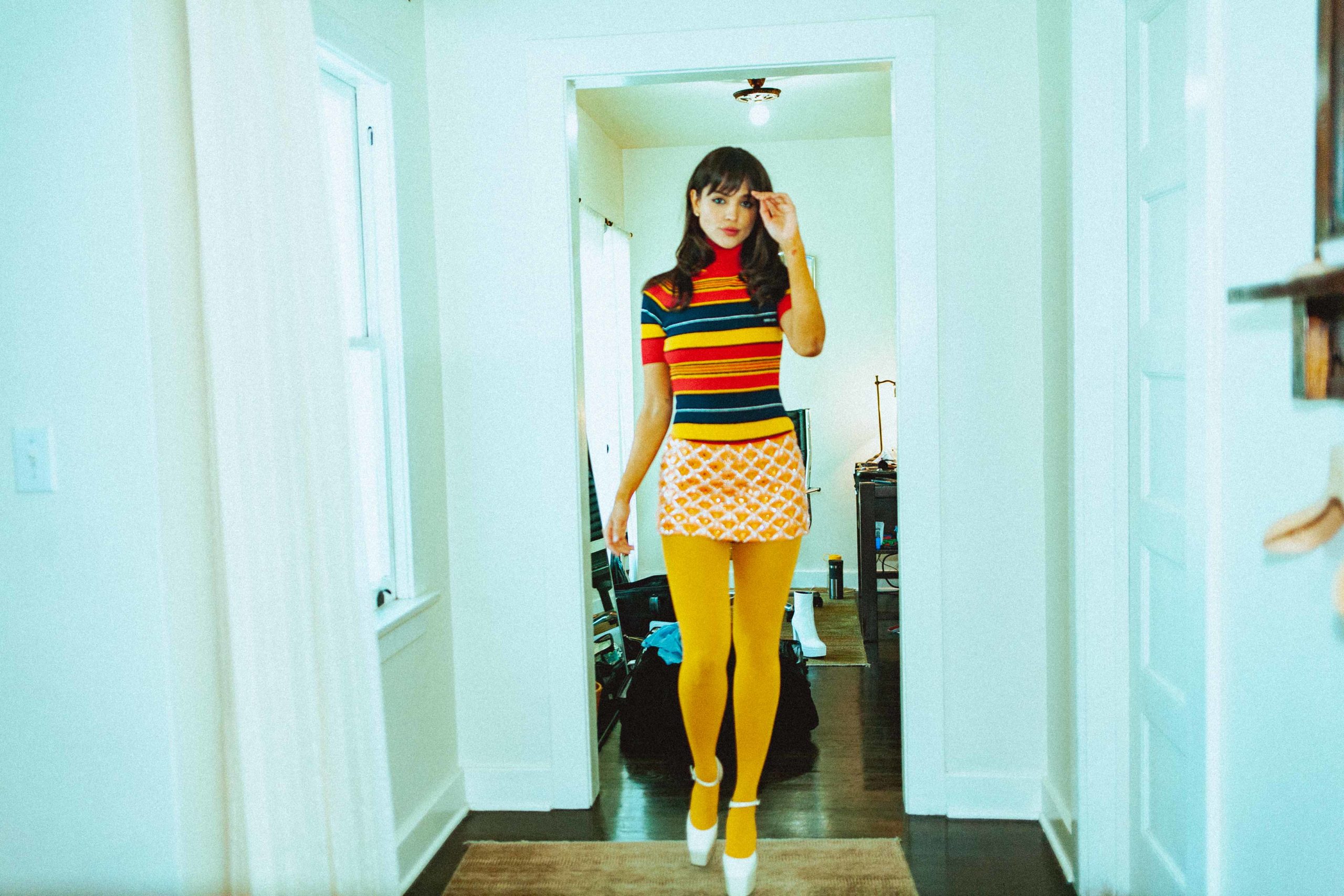
WAITITI: Every time I’d make a film, I’d come to L.A. and they’d offer me a script that was basically the film I’d just made. And that just meant that that’s the only way they saw me, was in what I’d done and not what I could do. So I would continue to go back home and make another film that’s completely different to everything else I’d made. And by the time Thor: Ragnarok came along, I’d done four completely different films where you couldn’t really say there’s a particular style that I have. Eventually someone did say, “This makes us interested for what’s next, and we’re not going to ask him to continue to do the thing he just did.” That’s when Marvel was like, “We think you should do Thor.” They were the first American studio to take a big risk on me. Ever since then, more doors have opened, and the people who are at the door have realized it’s more exciting when you don’t know what to expect from someone. That’s why I said to you, “Just be that fucking badass girl from Mexico City.” Because eventually someone will go, “Oh shit, she’s doing something different every time and does not want to be defined playing a bombshell, the boring character that everyone is expecting.”
GONZÁLEZ: I went through a phase where, when I got here, I was terrified of auditioning in English because I always thought I wasn’t good enough. My insecurity of coming from soap operas was predominant, so I was like, “How can I blend myself into being that version of what America thinks that I could be?” When I started gaining more confidence I was like, “I’m going to do something weird.” When I auditioned for Baby Driver, my audition was off. I was chewing gum the whole time, playing with my shoe, and I wasn’t paying attention to the other actor at all. I realized if I approach auditioning like an opportunity to act, then I can play with it and approach it with curiosity.
WAITITI: And be comfortable with making mistakes. Barely anyone can get it right the first time. And if they can, I always question them.
GONZÁLEZ: Do you find yourself directing actors, or do you just let them play?
WAITITI: It’s a mix. With someone I know quite well, I can sort of let them do their own thing. There’s a shorthand where I can say, “That was shit. Do it again. Didn’t believe it. Give us something else.” I also tell them that everyone is more than welcome to say, “That’s your direction? That was fucking terrible.” It goes both ways. I’m not a tyrant, and nobody gets to be a tyrant. It becomes a conversation. But every day is like a wrestling match with your ego, with self-doubt, with imposter syndrome, and all the anxieties of, “Shit, do I belong here? Were they fucking drunk the day they hired me?”
GONZÁLEZ: That’s how I feel all the time. As women, we battle so many other demons. My version of, “Are they drunk?” is, “Is it because they think I’m pretty or not pretty enough?” Even though I seem very outgoing, I’m very shy, especially on set. I’m very respectful of other people. I don’t speak up as much as I would like to because I feel like, “That’s the director, I shouldn’t say anything.” Now that I’m getting older, I’m feeling more comfortable saying, “No, I don’t think this is right.”
Something that I’ve always found really cool about you is you’ve always been true to your roots. I feel like that’s become such an important thing for me, too. Part of my superpower is that I have an insight into a whole culture that a lot of people in this country don’t. They always say that it takes you losing something to really appreciate it, and now that I haven’t been to Mexico in such a long time, I see so much beauty about things that I normalized while growing up there. I want to bring more opportunities to people from there. What I connected with you on is that you genuinely want everyone to succeed. You and your friends came up together. You were like, “We’re all going to make it and we’re going to make it as a team.” You weren’t like, “I’m going to be the star and you’re going to be nobody.” It was just like, “How do we all succeed?” That’s something I really want to do, too, because I have so many talented friends who are not getting opportunities, and I want to make that happen for them.
WAITITI: That’s cool. I miss New Zealand, and it’s really defined the way I tell stories, who I am, and my voice. My thing is more championing indigenous filmmakers, so I involve myself in trying to get those voices onto the stage a bit more, because we’re so often overlooked. And in Mexico as well. A thing that I don’t particularly care about is most of the people in Hollywood. I don’t really feel I owe you anything. But I care about young poor kids who don’t have many opportunities, the people who grew up like I did.
GONZÁLEZ: I’ve lacked a lot of mentorship when it comes to Latin film. I’ll get crucified for saying this, but there’s a group of Latin men who support each other a lot. But have we ever seen them push a Latin female filmmaker or just back them up? It’s only happening now, and I hate to believe that it has to do with this uproar of society standing up and being like, “It’s time for equality,” and them just feeling like it’s convenient. When I got here, I was like, “Who am I going to pick up the phone and call that has walked in my footsteps and has made it here?” I couldn’t call them because I was a nobody and there were no women who were trying to support me, especially from my country. That’s left a scar, but I would love for it to be a bit more like what you’re doing. I don’t know if I’m at that level of my career just yet, but I can try. I feel like Hollywood always puts us in one lane and creates this competitiveness that we don’t inherently have within us. I remember going to this Vanity Fair party and seeing all the Nicoles and all the Kates hanging out together, and I thought, “Wow, that’s so cool. They don’t feel like they have to have bad blood between them or compete because they wake up the next day and there’s another role for them.” So there’s enough space for all of them. And I feel like for us, it’s been kind of contrived in that sense so it creates this confusion that is not inherently in us, because I always want to support other women, but yet we are pegged against each other consistently by the business. It’s important to change that. I don’t want to just be the Latino. I’ve made a really big effort in my life to become a contemporary, multifaceted woman because that’s just who I am inherently. Not that I’m trying but that’s who I am. And I want to see that on screen and I want to be casted on things that have nothing to do with my last name or the color of my skin. And I also don’t want to feel like a racial card put into it to satisfy an audience. I want it to feel like I deserve to be front and center. So, I feel like finally the industry is catching up, slowly but surely.
WAITITI: For sure. And we live in a way more complex time now with things like casting, where you’re seeing the cast of films looking completely the same because it’s kind of like “We got to check off all of these different things.” It’s a complicated conversation to have because as two people of color, I think we both understand, “Yeah, we want to be represented. There needs to be inclusiveness.” But when every cast looks like, “There’s the Latin character, there’s the funny best friend, that’s the Asian friend character, there’s the black guy,” I don’t know of any group of people who checks all of those boxes. It doesn’t feel like real life to me, but at the same time, I’m like, “I don’t want to see all these things with just a white cast. You better mix it up.” But, as a filmmaker, I’m often aware of them. Like, “What is the reason we’re casting this person? Because they better be fucking good at what they do.” And that’s the first thing I want. I want them to be really fucking good. And then we can have the conversation about where they’re from. And thank god you are from somewhere else. That’s an extra cool thing to have on top of you being a good actor.
GONZÁLEZ: Exactly. Sometimes, for me, it becomes more like fighting the director’s concept of me. I get not getting a role because I didn’t do a good job, but not because you have a predisposed idea of me and you didn’t really let me show you. Let me show you what I’m capable of, and then tell me that I suck.
Hair Stylist: Bridget Brager at The Wall Group. Makeup Artist: Kate Synott at The Wall Group .Special Thanks Chateau Marmont.
